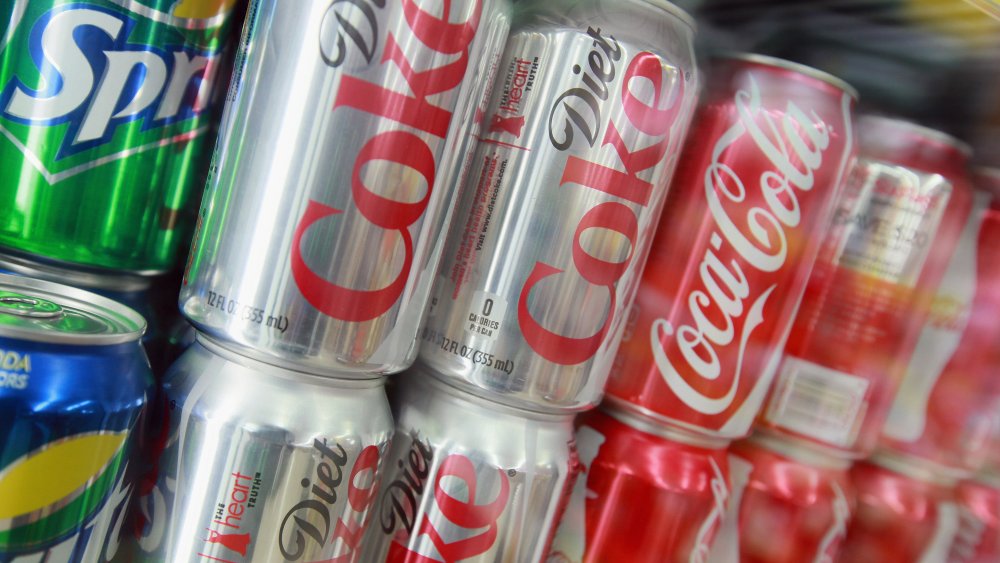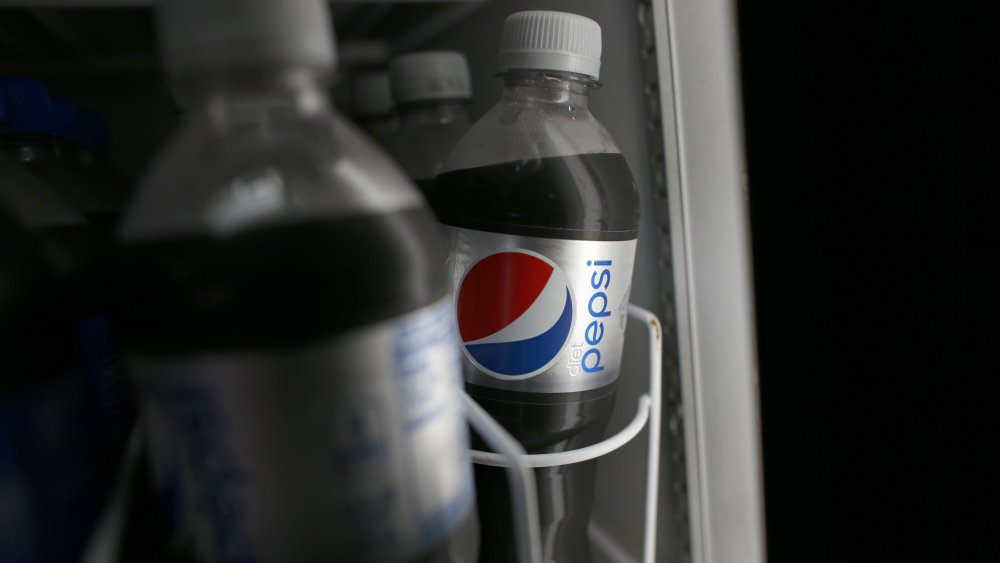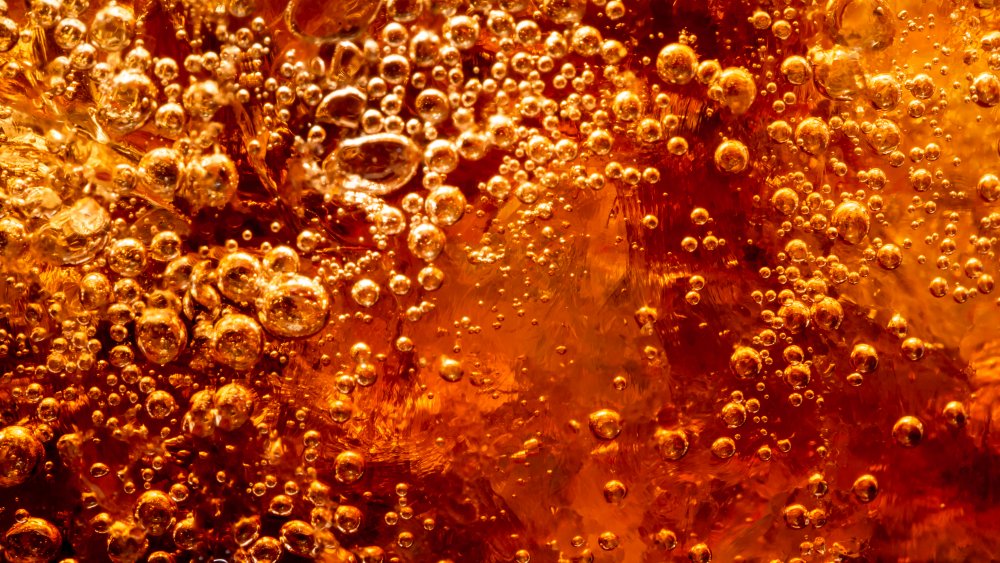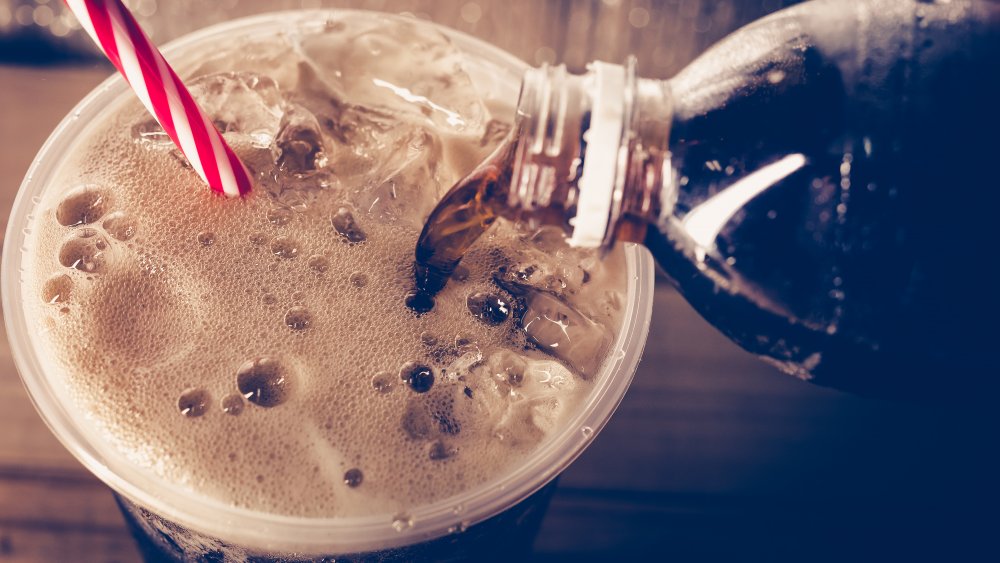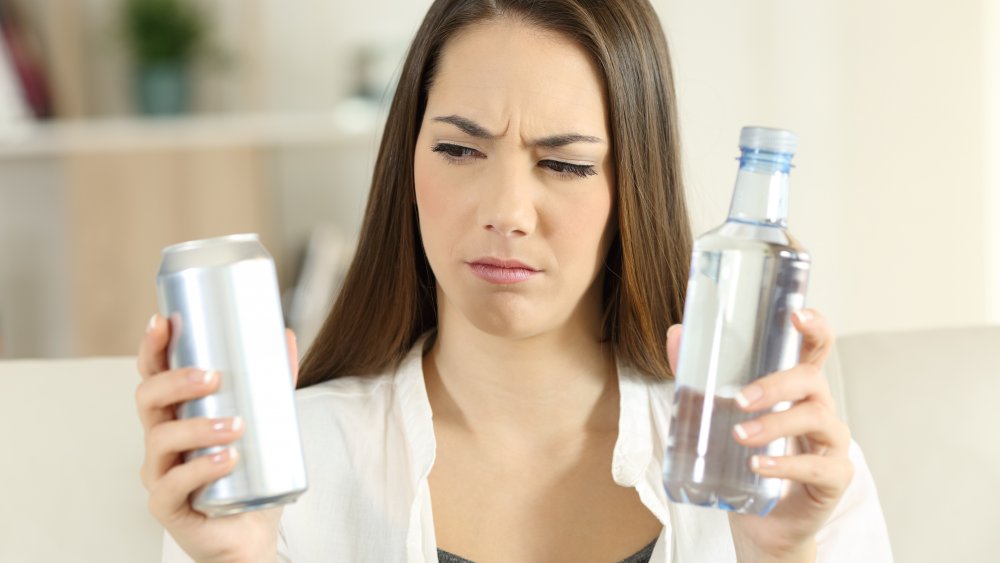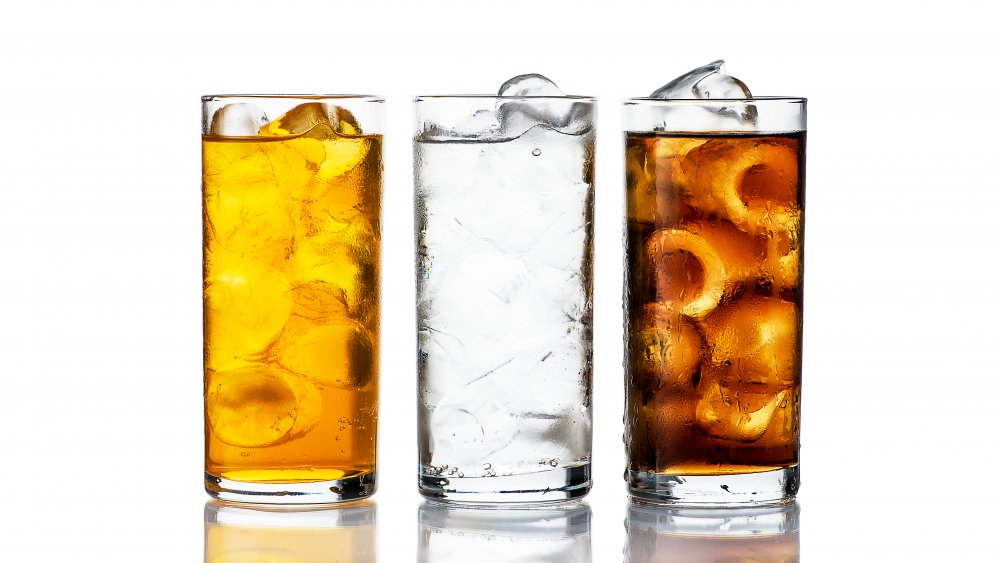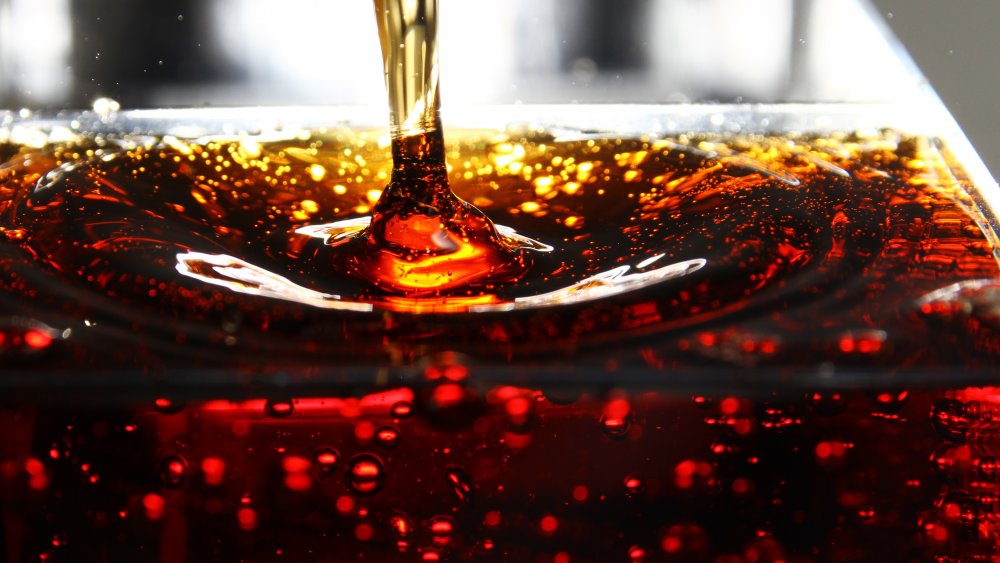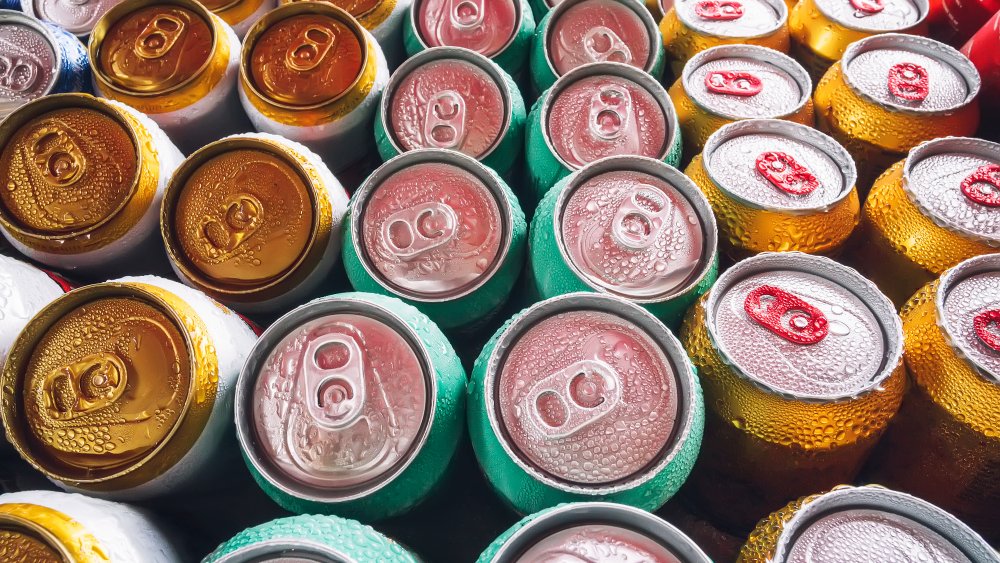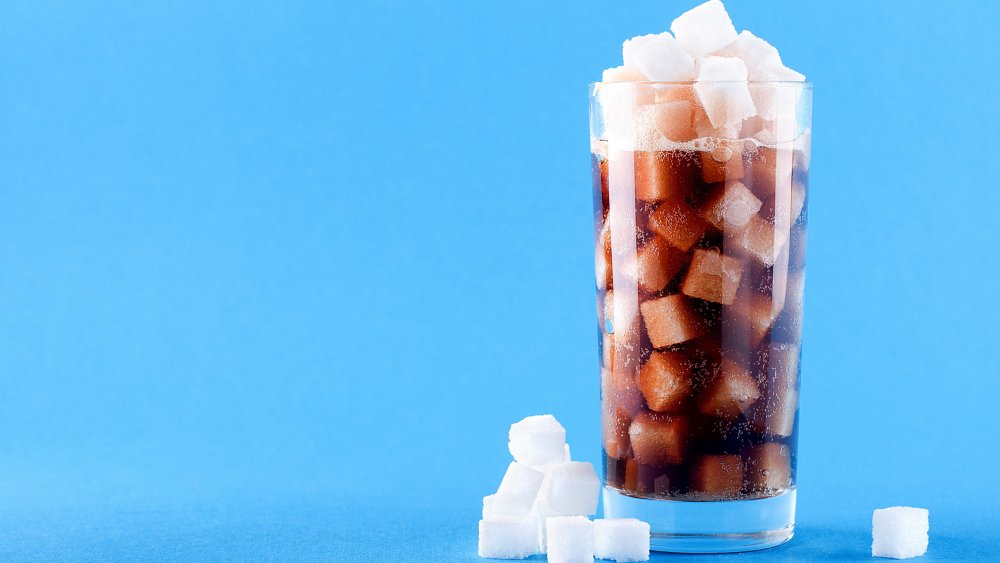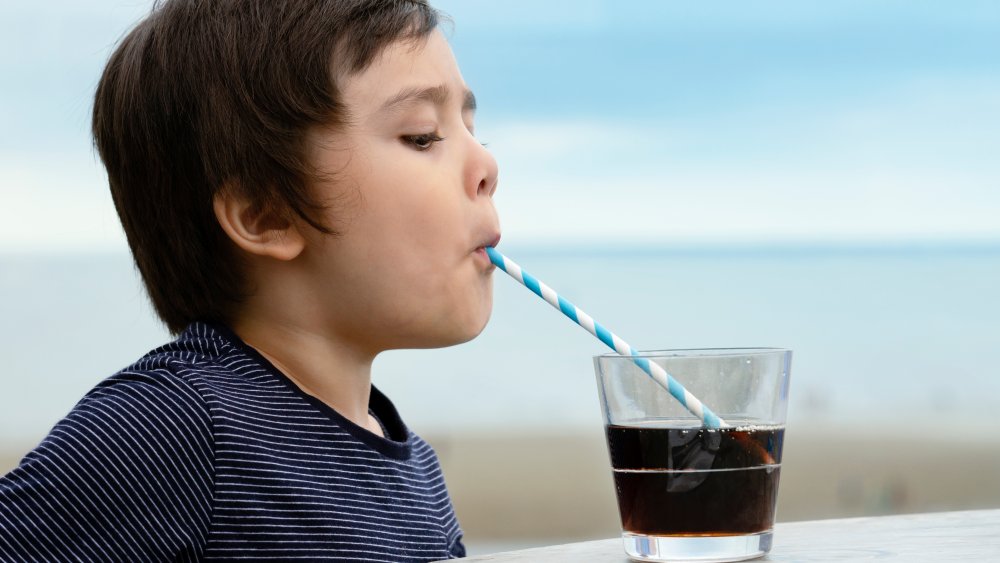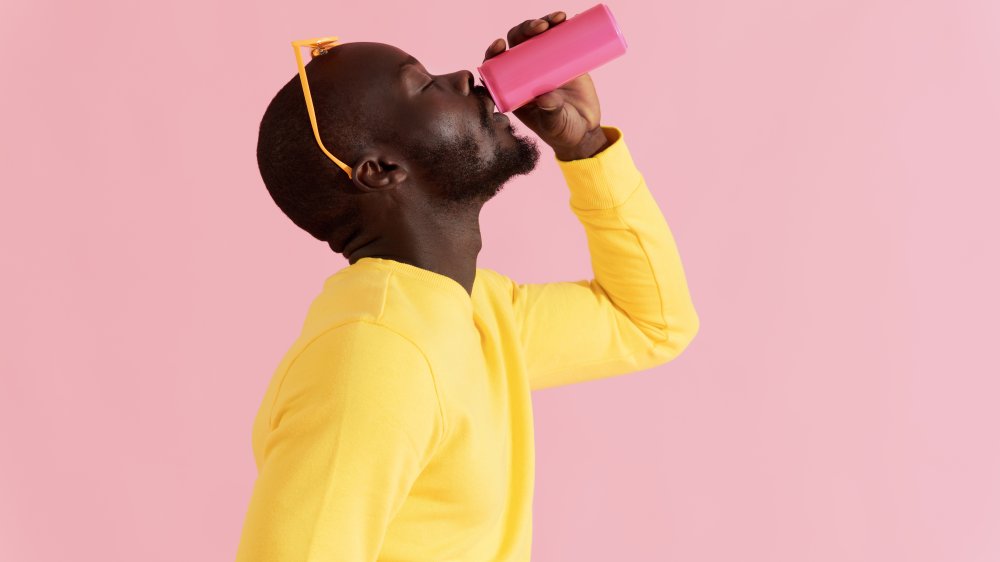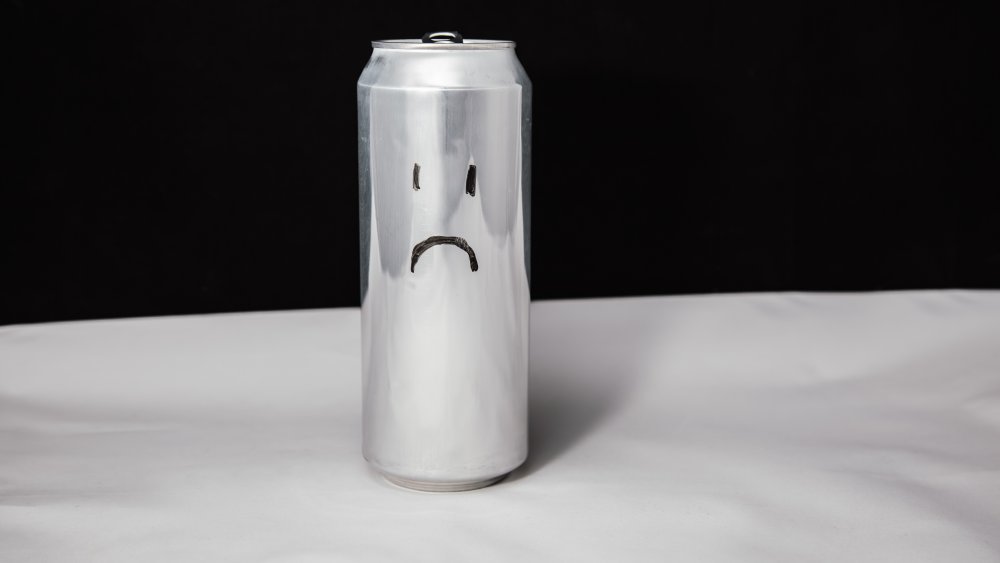Soda Myths You Probably Believed
Let's be honest: Whether you call it soda or pop, it's delicious. It's sweet and fizzy and it might just be the perfect beverage, whether you're drinking an ice-cold 7UP on a hot summer afternoon or kicking back with some Jack Daniels in your Coca-Cola after a super long day.
But if you feel a certain twinge of guilt or regret when you reach for a bottle at the grocery store, you're not alone. We all know that soda isn't great for us — it's full of sugar, and artificial colors and flavors, and it's pretty much just empty calories. We've all heard the lectures, and we've all heard other things about soda, too. You should definitely opt for diet because it's better for you. Right? And lemon-lime sodas? They're not nearly as bad for you as the colas. Are they? Because colas can clean pennies and dissolve all kinds of things, so just imagine what they're doing to your stomach.
That's ... all true, right? We did some digging, and it turns out that not everything you hear about soda is even remotely factual. So, let's talk myths, truths, and what you need to know before you buy into the hype.
Diet soda is definitely the healthier option
Come on, really? How can this be a myth? It says "diet" right in the name, so of course something that's lower in sugar and calories is going to be better for you ... right?
Not exactly. According to Healthline, the only real difference between regular and diet soda is what's used for sweetness. In diet sodas, you're drinking something artificial like aspartame or saccharin, and there's more and more evidence that suggests this isn't a good thing.
Studies have linked diet soda consumption with instances of diabetes, heart attacks, high blood pressure, stroke, and even liver problems, but just what is going on here isn't clear. Experts say that other lifestyle factors often present in the same people who tend to choose diet sodas — like a sedentary lifestyle and obesity — might be the cause and diet soda consumption is just a marker.
But that's not the whole story, either. Some research suggests that a diet soda habit might contribute to chronic inflammation, and that can lead to all kinds of health issues like heart disease, asthma, and even certain types of cancer. It's also possible that diet sodas impact the reward centers of the brain and cause your cravings for real sugar (which you're not actually getting in diet sodas, remember) to skyrocket, which isn't what you want when you're trying to get healthy.
Diet sodas will help you lose weight
Here's another myth that seems like a no-brainer: Of course diet soda will help you lose weight! There's actually some complicated science going on here, though, and according to Inc., research has suggested that those who drink diet soda are more likely to be heavier in the long term.
For starters, it's interfering with your body's insulin production. Your pancreas produces insulin to deal with the sugar you eat, and when you drink diet soda, your brain signals your pancreas to do its thing. But there's no actual sugar in what you're drinking — and that disrupts your metabolic process, which is crucial to maintaining a healthy weight.
There's something else going on here, too. Diet soda is actually sweeter than regular soda, and that can increase your cravings for more sweet things. Then, couple that with the fact that drinking diet soda might make you feel like you totally deserve that candy bar or those extra cookies because you were responsible enough to choose the diet soda option. And in the end? That can mean more calories and an expanding waistline.
It's just the sugar and calories in soda that are bad for you
Quick, what is it about soda that's so bad? It's the sugar and the empty calories, right? Sure, that's part of it, but some studies have suggested that the carbonation is bad for you, too — but not in the way you might think.
In 2017, researchers at Birzeit University looked at the impact of fizz on hunger. When they gave rats either tap water, a flat (but sugary) drink, or a fizzy (and still sugary) drink, the rats that drank the fizz ended up with more of the hormone ghrelin in their blood — and that's the hormone that makes you hungry. Ever had a can of soda at your desk, then later realized you were also super hungry? That fizz might be why.
The BBC did the same experiment on people and found that the results were similar. Not only were ghrelin levels higher in people who had fizzy drinks, but they also had the volunteers keep a food diary during the experiment. On average, fizzy-drink-drinkers ate around 120 calories more than those that had non-carbonated drinks. Who would have thought that fizz might be bad for your weight loss attempts too?
Carbonated sodas are bad for your bones
Here's one that sounds like it has some serious science behind it. The story goes, says Osteoporosis Canada, that the phosphorus content of carbonated sodas interferes with the metabolism of calcium, and in turn, has a negative impact on bone density and bone health — to the point where a long-term soda habit might increase your risk of osteoporosis.
Alternately, they say, it's also been claimed that it's also the acidity in soda that's bad for the bones, and that in order to counteract soda's acidity, the body taps into its calcium and magnesium stores, either in the blood or in the bone.
Both of those things sound just sciencey enough to be plausible, but there's good news: There's no evidence that suggests either of those are true. For starters, phosphorus is an important part of your bones anyway, and as for the acidity in soda? It's not nearly acidic enough to do what this myth claims. Busted!
Quitting a soda habit is as easy as putting the bottle down
You might know someone who's trying to cut back on their soda habit, and at a glance, it might seem like anything else you're trying to eat less of: Just don't buy it. Drink something else. Easy, right?
Not so fast. According to Ohio State University neuroscientist Gary Wenk (via CNN), soda has the perfect amount of caffeine, carbonation, and sweetener to trigger the release of dopamine in the brain. He explained: "The sugar in the drinks ... swish through the brain, you get the dopamine rewarding you, and then the effect of the dopamine surge is gone almost as fast as it arrived, leaving your brain wanting more."
If you think that sounds like a recipe for addiction, you're absolutely right. Healthline says that soda addiction — or at least, dependency — is a very real thing, and it's characterized by strong cravings, a preoccupation with your next soda break, and difficulty in reaching for another beverage option ... even though you know you probably should. So it's definitely a myth that this stuff is easy to put down. Since there are so many bad side effects, they say that soda dependency is definitely something that should be broken — and in some cases, some individuals might need to seek professional help to break the cycle of daily sodas.
Clear sodas are healthier than dark ones
Stop us if you've heard this myth: Clear sodas like 7UP and Sprite, are a healthier option than colas. It makes sense, right? Probably something about all the extra coloring that's added to colas, yes?
Nope. According to LiveStrong, all sodas have the same basic ingredients: high-fructose corn syrup and carbonated water. Yes, the dark ones have coloring, but when it comes down to the bottom line, sodas have no nutritional value whatsoever. The color doesn't actually make one better or worse than another.
When it comes to what soda do contain, the basics are pretty much the same. While there's a wide variety of flavors, additives, and colors, the USDA says that the different varieties of soda tend to be pretty close when it comes to things like calories, carbs, and sodium. It's just the caramel color that's the difference, and perhaps the best way to put it is that the clear soda? It's pretty bad for you, too.
Soda can dehydrate you/isn't as hydrating as water
You've probably heard this myth a million times: It's important to stay hydrated, and soda isn't going to do that for you. There are even claims that drinking too much soda can have the opposite effect and dehydrate you. But here's some good news for soda lovers: That's just not true.
According to Cooking Light, the reasoning behind the claim is that most soda contains caffeine, and caffeine is a diuretic. But experts say that sure, you might not retain as much fluid as you would if you just drank water, but you're not going to end up with a fluid loss because you're reaching for a can of Pepsi. You're still getting fluids, even though what comes along with those fluids might not make it the best choice.
Because of the sugar and calories in soda, it's not highly recommended for regular consumption, but if you're feeling dehydrated or super thirsty and soda is all you have at hand, it's definitely not going to do you any harm, hydration-wise. (And as a footnote, the same is true of sparkling water — the rumors you've heard that carbonated water can't hydrate you as well as still water are also complete bunk. You're welcome, LaCroix lovers!)
All those acids in sodas are oh-so-dangerous
Every so often, claims about the acidity of sodas will go viral on social media. Coca-Cola will dissolve a tooth! It'll remove rust, dissolve nails, and clean toilets! Imagine what that's doing to your insides! Is any of it true?
Snopes took a look at some of the myths and traced many back to a 1995 book called Polish Your Furniture with Panty Hose by Joey Green. On his website, he added the idea that all these uses for Coke make it unsafe to drink, and while that possibly came from a 1950 study from Cornell University that tried to link soda with cavities, well, these extremes just aren't true. While Coke does contain ingredients like citric acid and phosphoric acid, they're in such low concentration that they're perfectly safe. By comparison, the gastric acid in your stomach is much, much stronger than anything you'll find in a soda. Heck, Snopes says that even an orange is more acidic than soda!
So no, soda will not dissolve a tooth (or a nail, or a steak, or anything else) overnight, but you can actually use it to remove stains. Although you can also use plain soda water for the same tasks, so there's that.
Rat urine on soda cans can make you sick
Before you open a can of soda, do you rinse it? Or at least wipe it off? If you do, that's possibly because you've heard those cans can sit in warehouses for a while, and there's probably rats crawling all over them, and you know rats don't use toilets, right? Do you want to catch something by putting your mouth on that can where rats have peed and pooped?
Aside from the fact that that's pretty gross, is it possible? Or just a myth?
According to Snopes, it's entirely possible for someone to contract an illness called Leptospirosis by being exposed to the urine of rats who are carrying the disease. But when they looked at the claims that people have gotten sick from drinking out of urine-covered soda cans, the whole thing just kind of falls apart. Those people and those incidents just don't exist, as far as experts can tell. Even the Centers for Disease Control and Prevention say they were unable to verify the stories in various emails, like the one about the stock clerk who was exposed to hantavirus. That same email warns readers to wash their soda cans, but here's the thing: When cans are sitting in warehouses, they're usually packaged in cardboard boxes. And it makes sense, because, well, you wouldn't want to try to move loose cans of soda with a forklift, right?
'Real sugar' sodas are healthier
We've all heard about how bad ingredients like high-fructose corn syrup are, and we know we should try to limit how much of that we're eating (or drinking). That makes it kind of believable that soda made with real sugar should be better for you, right? It's a little more natural and it's less processed, the theory goes, and it's been at the heart of numerous marketing campaigns.
But is it really healthier? No, that's a myth — and if you really take a close look at those campaigns, you'll see they don't go quite as far as making that claim ... just implying it.
Lisa Sasson of New York University's Department of Nutrition, Food Studies, and Public Health says (via Time) that real sugar — in spite of the hype — isn't better. "It really doesn't matter. Sugar is just sugar," she says. "It's broken down and it's the same in our body."
Dr. David Katz of the Yale Prevention Research Center even went a step further, saying that if corn syrup was to be completely replaced with sugar, there would be no "public health benefit." Sugar is just sugar, no matter where it comes from.
Pop Rocks and soda
Here's an oldie but a goodie, and when it comes to soda myths, we wouldn't feel like we've been complete without addressing this one: It's the story of LIFE cereal's Little Mikey, who died after eating Pop Rocks and drinking soda.
No, he absolutely didn't, says Snopes. The actor who portrayed him, John Gilchrist, has spent years trying to convince people that he didn't die after a lethal dose of Pop Rocks and soda. And it's a rumor that's been going around for a long time — friends, neighbors, and acquaintances have even called his mother with condolences!
The worry about Pop Rocks was real, and the FDA even set up a telephone hotline for worried parents to call and confirm that no, there was no danger their kids were going to choke on the carbonated candy. Rumors about the deadly combination go back to at least 1979, and even though General Foods has tried everything, this is one urban legend that just doesn't seem to want to go away.
Tap on a can of soda to safely open it
Is there anything worse than looking forward to a nice, cold can of cola, then popping the top only to be covered in the sticky spray of a pressurized can? How many times did your siblings think shaking a can of soda before handing it to you was the height of hilarity? But there's a trick, right? If you still tap your soda can before you open it to keep it from foaming over you're certainly not alone, but here's the thing: It's just a myth.
Not only does it not work to relieve built-up pressure, but LiveScience says that by tapping the can, you're not breaking up bubbles at all — you're possibly adding more energy to what's a closed system, and in turn, you're creating more bubbles inside the can, increasing the chance it's going to foam when you open it.
The only thing that actually works is time and patience: Let the can sit for long enough, and the bubbles inside will burst, allowing you to safely open — and enjoy — that fizzy beverage without wearing it. You might be able to speed up the process by changing the temperature of the can (i.e., putting it in the freezer for a short time), but still, it's just going to take time.
A soda habit can cause depression
Here's an example of one of those myths that the media can blow out of proportion. In 2013, headlines ran with the results of a study done by the National Institutes of Health. They found that drinking soda was associated with an increased risk of depression, and that led to the widespread rumor that soda causes depression. But NYU professor of nutrition Dr. Lisa Young says (via The Huffington Post) that's not actually what the study found.
She says that an association is not the same as a cause: "I'm not a fan of diet soda, but I don't think it's the soda alone that's causing depression. The thing about soda is, you don't often drink it alone — you drink it with junk food. You're not getting enough fiber and protein with that sugar, and your blood sugar not being stable could throw off your mood."
She also suggests that those who drink a ton of soda might be making other lifestyle choices that aren't the best for them, and that's all piling on someone's shoulders. The Smithsonian puts it this way: There's a huge difference between "the chemicals in soda cause changes in the brain that result in depression" and "people who suffer from depression tend to prefer the dopamine rush of a sugary soda." See the difference?

